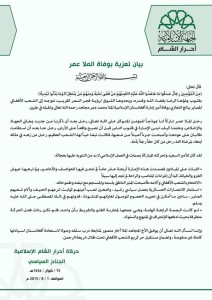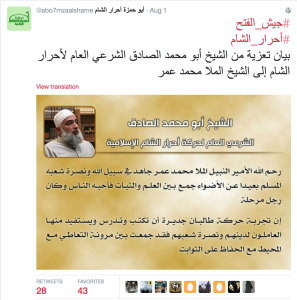Just one day after the Taliban confirmed that Mullah Omar was dead, the Syria-based jihadist group Ahrar al Sham heaped praise on the Taliban leader in a statement released online.
Ahrar al Sham said Mullah Omar was an “example of a believer,” who “reminded us of the true meanings of jihad and sincerity [or devotion].” Omar “taught us how to build the [Islamic] Emirate in the hearts of the people before it becomes a reality on the ground,” Ahrar al Sham explained. The statement can be seen on the right.
Describing Omar as the “blessed commander,” Ahrar al Sham said his “blessed movement” (the Taliban) was poised for a comeback in Afghanistan due to his stewardship.
Omar’s supposedly strong leadership characteristics include remaining “steadfast for 14 years” against the “armies of invasion and…betrayal,” collaborating with the Afghan people such that the Taliban came to embody “their wants and demands,” fighting “extremism” (meaning jihadist groups like Abu Bakr al Baghdadi’s Islamic State), and continuing with both “military victories” and “guided political efforts” as the Prophet Mohammed had done.
The last quality is an obvious reference to the Taliban’s decision to participate in negotiations with the West and its other adversaries even as it continues to wage jihad. This approach is somewhat controversial in jihadist circles. But Ahrar al Sham is following the same course, portraying itself (and the Taliban) as an alternative to the “extremism” of other jihadists, including the Islamic State.
Indeed, a representative of Ahrar al Sham, Labib Al Nahhas, published two op-eds in Western newspapers in recent weeks. The first appeared in the Washington Post on July 10, while the second was published in the Daily Telegraph (UK) on July 21. Both pieces contain obvious fictions. And both were intended to mislead a Western audience into thinking that Ahrar al Sham is something other than an extremist or jihadist group.
Nahhas wrote in the Post, for instance, that his organization has “been falsely accused of having organizational links to al Qaeda and of espousing al Qaeda’s ideology.” This claim does not pass the most basic smell test. Ahrar al Sham fights alongside the Al Nusrah Front, al Qaeda’s official branch in Syria, on a day-to-day basis. Al Nusrah and Ahrar al Sham have formed coalitions throughout the country to battle their common enemies, especially the Assad regime and the Islamic State. The two groups are blood brothers, a fact that has been recognized by some of Ahrar al Sham’s own leaders.
Moreover, Ahrar al Sham has been seeded with senior al Qaeda operatives. Ayman al Zawahiri’s top representative in Syria was Abu Khalid al Suri. A longtime al Qaeda operative, al Suri was killed in February 2014. In addition to serving al Qaeda, al Suri was also one of Ahrar al Sham’s most influential leaders.
After al Suri was killed, presumably at the hands of the Islamic State, Zawahiri released a glowing eulogy in which he described al Suri as his “advisor.” Other known al Qaeda jihadists have joined and led Ahrar al Sham as well.
While Ahrar al Sham has tried to hide some of these connections, its praise for Mullah Omar is difficult for its apologists to explain away.
Omar’s Taliban state, which Ahrar al Sham holds up as an example of a true Islamic emirate, was as radical as they come. Long before the Islamic State celebrated gory executions in its propaganda, the Taliban gained worldwide infamy for its brutality. The Taliban and al Qaeda have modified their approach to waging jihad by attempting to build more popular support for their cause. But their end goals remain unchanged. And Ahrar al Sham’s praise for this adjustment in tactics shows that it has also adopted a more gradual model for inculcating its beliefs into Syrian society. The Al Nusrah Front, which openly adheres to al Qaeda’s manhaj (methodology), is following a similar path.
Ahrar al Sham’s eulogy for Omar ends with a request for Allah to help “the Mujahid brother Mullah Akhtar Mohammad Mansour,” the Taliban’s new leader, “follow in the footsteps of his predecessors” and “return Afghanistan to its noble ones completely…under the sharia [law] of Allah.” Thus, Ahrar al Sham has explicitly connected its own jihad to the Taliban’s ongoing effort to return to power.
In addition to the official statement, Ahar al Sham’s leaders mourned Omar on their Twitter feeds. Below is a collection of tweets from their accounts.
Ahrar al Sham leaders honor Mullah Omar on Twitter
Ahrar al Sham’s military commander, Abu Saleh Tahhan, tweeted the message below with a hashtag commemorating Omar:
Abu Muhammad al Sadiq, a senior sharia official in the group, tweeted his own support for Omar, the Taliban and its policies:
Separately, an Ahar al Sham-linked Twitter feed posted this eulogy for Omar attributed to al Sadiq:
The tweet below was posted by Khalid Abu Anas, a senior Ahrar al Sham official. Abu Anas has consistently advertised his respect for al Qaeda’s jihadists. He similarly honored Nasir al Wuhayshi, the emir of al Qaeda in the Arabian Peninsula and al Qaeda’s general manager, after Wuhayshi was killed in June. Abu Anas said the Taliban consistently frustrated its enemies under Omar’s tenure:













3 Comments
The Ahrar-al-Sham as you rightly say is no moderate faction. In their territories in Syria, just like in the Islamic State have done in Iraq and Syria, they have put billboards asking women to cover themselves in the niqab (the ones that cover everything except your eyes). Certainly no secular group, this organisation is !!
at some point all these laudatory expressions of recognition fade. There is no substitute for more man power, war fighting material, leadership & success on the battlefield. Without the aforementioned those being singled for praise are nothing than names on a tombstone & epitaph’s for scribes & philosophical/theological meanderers
The idea that an Islamist rebel group in Syria wouldn’t have links with AQ is just not realistic. Ahrar al Sham is “reasonable enough” (i.e more Islamist than international jihadist) for Turkish and Gulf intelligence agencies to work with. And well that they do. Waiting for, or trying to create viable rebels who pass Western approved ideological purity tests is a failed strategy that has allowed ISIS to thrive and contributed to the humanitarian disaster we see today.